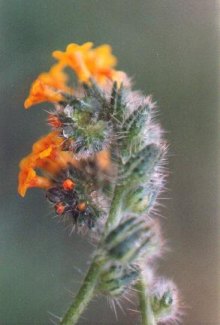|
 FIDDLENECK - Amsinckia sp. Amsinkia sp. Amsinkia, Borage, Fireweed, Tarweed. Some of these are endangered
species. Caution: flowers and seeds are toxic. A. intermedia causes hepatic cirrhosis in cattle and swine, and
walking disease in horses, but sheep are immune.
FIDDLENECK - Amsinckia sp. Amsinkia sp. Amsinkia, Borage, Fireweed, Tarweed. Some of these are endangered
species. Caution: flowers and seeds are toxic. A. intermedia causes hepatic cirrhosis in cattle and swine, and
walking disease in horses, but sheep are immune.
A. intermedia (A. abbreviata, abramsii, ammophila, amplexicaulis, angustifolia, arizonica,
attenuata, californica, campestris, demissa, douglasiana, eastwoodae, echinata, hanseni, intactilis, irritans,
johnstonii, jonesii, jucunda, longituba, lycopsoides, menziesii, micrantha, microphylla, nana, obovallata,
parishii, rigida, sanctae-barbarae, sancti-nicolae, splendens, stenophylla, valens, verna): Buckthorn
Weed, Coast Buckthorn, Coast Fiddleneck, Fireweed, Fireweed Fiddleneck, Menzies' Fiddleneck, Ranchers Fiddleneck,
Small Flowered Fiddleneck, Zaccato Gorda. The leaves are edible raw in a salad. Get them young in February. The
leaf and root tea is used as an eyewash, and, used internally for the nerves of the eyes, it improves eyesight.
This plant is liked by Painted Lady Butterflies.
A. tessellata (A. collina, conica, macra, pustulata, lemmonnii, Amsinchia t.).
Tessellate Fiddleneck, Tessellate Fireweed. Kawaiisu: Tivanibi. The greens are edible in the spring. They are
bruised between the hands and eaten with salt. When the stickers develop, the leaves are no longer edible.
A. spectabilis (A. acuminata, cana, celsa, constricta, maritima, nigricans,
?lycopsoides): Bugloss Fiddleneck, Bugloss Fireweed, Seaside Amsinckia, Tarweed Fiddleneck. See
Scorpion Weed.

|

